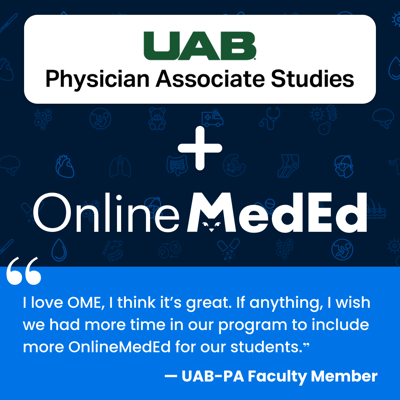Integrating OnlineMedEd into the University of Alabama Physician Assistant (UAB-PA) Program
Enhancing Clinical Readiness

Background
The University of Alabama Physician Associate (UAB-PA) program is the second oldest PA program in the U.S. and is currently ranked 21st out of over 300 accredited programs by the 2025 US News Report. The program provides a robust didactic and clinical curriculum that prepares students to practice medicine in all settings and specialties, to include a special emphasis on surgical training.
In 2024, the program expanded its use of OnlineMedEd resources, providing students with access to OnlineMedEd’s educational tools for a total of 16 months—covering the final 4 months of the didactic (P1) and the entire 12 months of the clinical (P2) year. OnlineMedEd was integrated into the curriculum as a supplemental resource for clinical rotations, remediation, and exam preparation, aiming to enhance both students' surgical knowledge and their overall clinical readiness.
Context and Implementation
UAB-PA’s clinical year (P2) focuses on clinical rotations, where students engage with hands-on learning but sometimes encounter fewer patient cases than required by the ARC-PA. To address this, OnlineMedEd's CaseX cases were introduced to supplement learning when clinical encounters were limited. These case-based exercises offer students exposure to clinical scenarios, enhancing understanding of surgical and clinical concepts.
Starting in the fall 2024 semester, the program expanded OnlineMedEd access to include the final four months of the didactic (P1) year, in addition to the clinical year. This new offering gives students access to OnlineMedEd’s newly launched Clinical Qbank, which faculty have found helpful for preparing students for both their end-of semester UAB-derived Comprehensive Exam and the standardized PAEA-derived PACKRAT I.
Incorporating OnlineMedEd’s Clinical Qbank allows students to generate their own formative quizzes through the “Generate Quiz” function. These quizzes are designed for self-study and provide a flexible learning tool. While there is no strict timeline for quiz completion, UAB-PA students must achieve scores of 70% or higher on each quiz, with the option of multiple re-takes until 70% is achieved. Although quizzes are primarily for learning purposes, the program has emphasized their role in improving clinical knowledge and ensuring that students can effectively apply their learning to real-world scenarios.
Findings & Outcomes
Feedback from both faculty and students has been overwhelmingly positive, particularly regarding the in-depth nature of OnlineMedEd’s Qbank questions. One student commented, “OnlineMedEd questions are so in-depth, so much deeper than what we cover in class.” Faculty similarly appreciate the higher-level cognitive demands of the questions, noting that while End-of-Rotation (EOR) exams may test basic knowledge, OnlineMedEd’s questions challenge students to understand the material at a deeper, clinically relevant level. This deeper learning is crucial for future clinicians, as the goal is to go beyond rote memorization and engage with the material in a way that fosters critical thinking and clinical application.
Student survey feedback reflects the success of integrating OnlineMedEd into the curriculum. In the 2024 Clinical Year Survey, students rated OnlineMedEd’s usefulness for their EOR exams with an average score of 4 out of a 5 point scale, surpassing the program's benchmark. Faculty have expressed a desire to incorporate even more OnlineMedEd resources into the program, and plan to pre-select questions and assign quizzes to ensure consistency across all students, further enhancing the structured use of OnlineMedEd in the curriculum.
Conclusion
The integration of OnlineMedEd into the UAB-PA program has proven to be an effective tool for both remediation and exam preparation. The use of OnlineMedEd's Clinical Qbank and CaseX cases aligns with the program's objectives of fostering deeper clinical knowledge and improving students' readiness for their future roles as healthcare providers.
Positive student and faculty feedback highlights the value of OnlineMedEd’s comprehensive resources, which support the development of critical thinking and clinical problem-solving skills. With continued integration and the potential for future enhancements, OnlineMedEd will remain a cornerstone of UAB-PA’s educational approach, helping students thrive in their clinical training and examinations.
Updated June 2025

